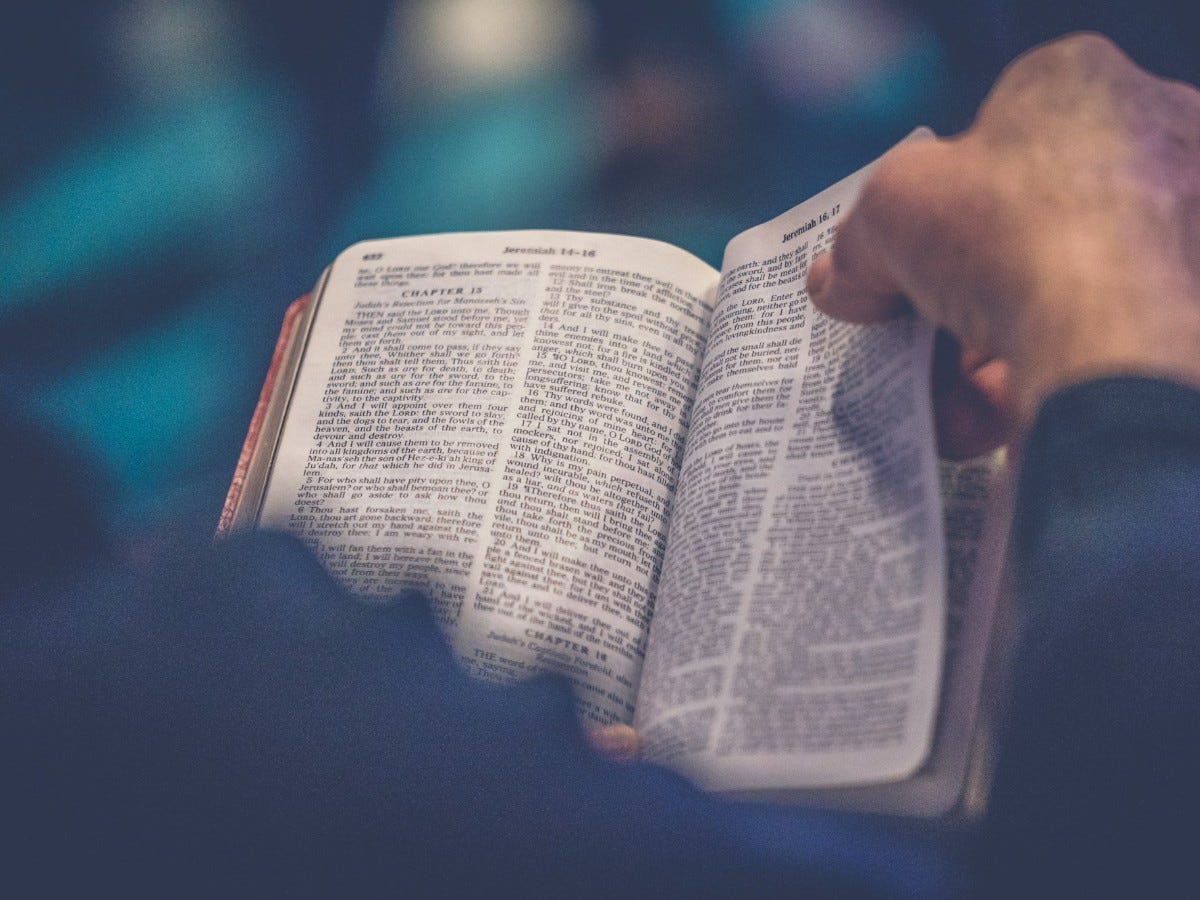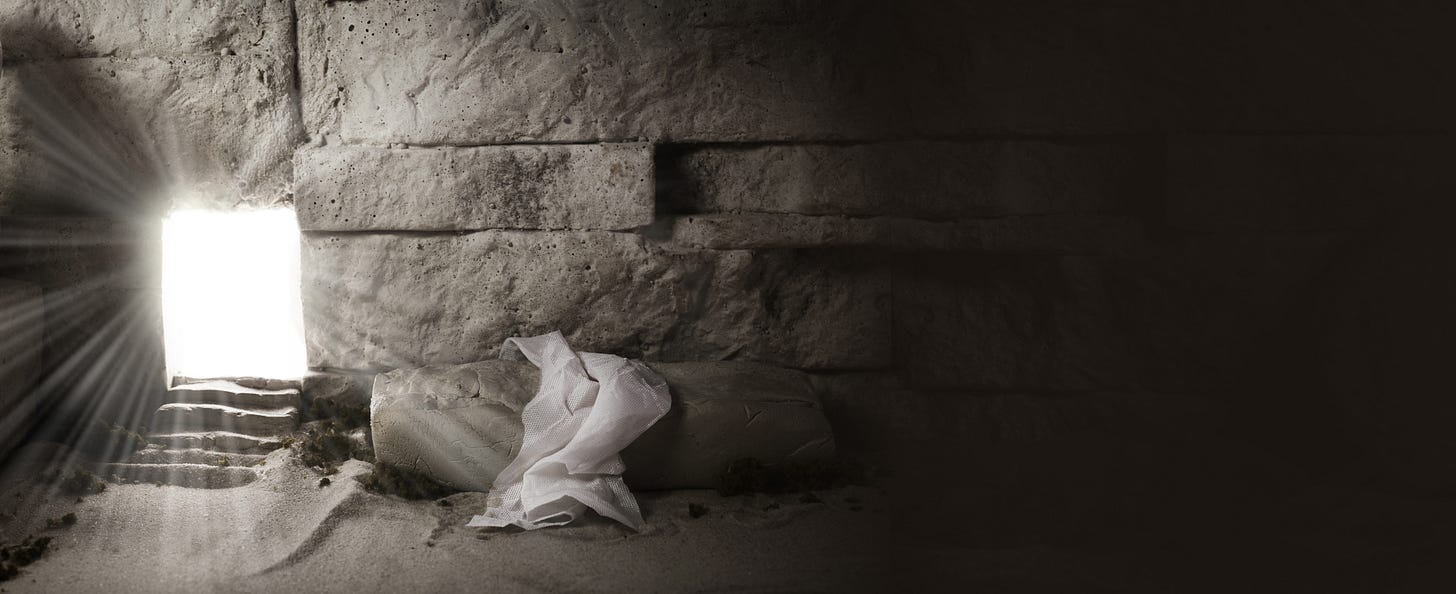You may listen to the audio version of this post by clicking on the Substack audio play button located at the top right of your screen on this post. I believe you will find it easy to listen, and audible learning may be more beneficial for you.
The bottom of this page contains a link to download and print a PDF of this post. I trust you will discover God’s rich blessings for you and your family in Jesus by reading or listening to Turning on the Bible Light 💡.
The LORD said through the prophet Isaiah: I made heaven and earth! I own it all! Here’s My Decree. I’m looking for a humble and contrite person who reverently responds to what I say. Isaiah 66:2 - The Message.
Reading through the Bible is beneficial when your reading isn’t superficial.
The Wall Street Journal recently reported that Bible sales are surging across the country, even as print books sales remain much the same. The news outlet’s story attributed the increase in Bible sales to first-time buyers, with U.S. sales up 22%.
For first time Bible readers as well as others who may have made past New Year’s Resolutions to read through the Bible but found yourself confused and frustrated, eventually quitting, you’ll find some great, helpful hints to make reading the Bible easier and more beneficial.
A human body without bones is only tissue and fluid with no structure nor ease of movement.
So too, reading through the Bible without a systematic skeletal structure behind your reading leads to mass confusion and a blob of misunderstanding.
Let’s get started on building a simple structure of the Bible in your mind.
Here Are 7 Helpful Hints for Reading Your Bible.
#1. It’s not about You; It’s about Jesus Christ.
One of the great mistakes people make when they read the Bible is thinking it was written for them. The Bible was not written to you, but it is a gift for you.
The Bible was written to specific people over a significant time for a special purpose.
My grandmother once gave me a letter that my grandfather wrote to A.W. Pink during World War II. That letter hangs framed on my office wall. Although it wasn’t written to me, its content is an extraordinary gift, immensely blessing me each time I read it.
That’s a description of the Bible.
The Old and New Testaments were inspired by God and written by men to other people in history, instructing them about God and His mercy for sinners.
We draw applications from every page of the Bible as we read it. Still, we’ll never be in the right mindset when reading the Bible unless we recognize that we’re reading the history and story of Someone else presented to somebody else.
A man who thought the Bible was written to him sought guidance from it. He decided to randomly open the Bible, place his thumb on a verse, and then follow whatever it said.
He closed his eyes, flipped open the Bible, and landed on Matthew 27:5, and read, Judas went away and hanged himself.
Shocked but undeterred, he decided to try again. This time, his thumb landed on Luke 10:37: Go and do likewise.
In a panic, he tried one final time and his finger landed on John 13:27 where he read: What you are about to do, do quickly.
This joke illustrates that you should read the Bible to learn about Jesus the Messiah and not act as if every verse was written to instruct you on how to live.
But grow in grace and the knowledge of our LORD and Savior Jesus Christ - II Peter 3:18
When Jesus walked on the road to the little village of Emmaus after His resurrection, He spoke to two of His disciples, most likely a man and wife, who initially did not recognize their risen LORD. Before Jesus opened their eyes to recognize Him, Jesus did something quite extraordinary. He explained to them how they could see Him in the Hebrew Scriptures, what we call the Old Testament.
#2. You’ll Only be Free When It’s Jesus You See.
Jesus said I am the Way, the Truth, and the Life – John 14:6
You will know the Truth, and the Truth will set you free - John 8:32
The fundamental difference between religion and true Christianity is that religion tells you how to perform for Jesus, but true Christianity tells you how Jesus has performed for you.
Until the Good News of Jesus and what He did for sinners captivates your heart and mind, you’ll go through life thinking it’s what you do for God that sets you free.
The Truth that sets you free is what God has done for you through Jesus Christ.
The Greek word Christ translates the Hebrew phrase Anointed One or Messiah. Christ is His title. Jesus, or Yeshua in Hebrew, is His name.
So, as you read the Bible, think to yourself: What am I learning today about God’s grace to me, the chief of sinners, especially about His love for me in Jesus, which truly sets me free?
The more we appreciate God’s love for us in Jesus, the more unconditionally we’ll love others in their sin.
Martin Luther said: A Christian is the most free person of all, and subject to none; a Christian is also the most dutiful servant of all, and subject to every one.
#3. The Bible Is Divided into Two Covenants: The Old Testament and the New Testament.

The word covenant means testament. We don’t use testament very much in modern English except when someone dies, and a court reads their loved one’s Last Will and Testament to the family.
Both words covenant and testament mean an agreement or promise.
We use the word covenant in English in phrases like: ‘Our housing addition has a neighborhood covenant’ - or - ‘Our pastor asked us to sign a church covenant.’
THE TWO MAJOR COVENANTS IN THE BIBLE ARE:
#1. - God’s conditional with the people of national Israel to fully obey and honor God (The Old Covenant).
THE PROMISE: If you fully obey the Lord your God and carefully follow all his commands I give you today, the LORD your God will set you high above all the nations on earth. - Deuteronomy 28:1
#2. - God's unconditional covenant with sinners from every nation who trust Jesus (The New Covenant).
THE PROMISE: For all the promises of God find their Yes in Christ. That is why it is through Jesus Christ that we utter our Amen to GOD for His glory - II Corinthians 1:20
The Old Testament details the first covenant, which is called the Old Covenant in the New Testament. The New Testament reveals the second covenant, which Jesus calls the New Covenant. This New Covenant is eternal, and the prophets of the Old Testament, including Isaiah, Jeremiah, Ezekiel, and Daniel, prophesied this New Agreement would come through the Messiah.
The first covenant with national Israel - or Old Covenant - began with the establishment of Israel as a nation in 1445 BC and came to a legal end when Jesus Christ died on the cross “for the sins of the world” on Thursday, April 6, AD 30, and three days later rose from the grave before sunrise on Sunday, April 9, AD 30.
The night before his death, Jesus told his disciples that His death would inaugurate a New Covenant God would make with sinners around the world, an agreement Jesus names in Luke 22:20.
On the cross, Jesus said, “It is finished.” All that Jesus came to accomplish for sinners had been completed. Three days after Jesus died on the cross, He rose from the dead by the power of the Father, sealing the New Agreement with sinners for eternity.
God now gives eternal life to sinners who trust Jesus’ performance on their behalf.
For God so loved the world that He gave His only begotten Son that whosoever believes in Him should not perish but have eternal life - John 3:16.
That’s Good News.
After the resurrection of Jesus, God’s Agreement with the nation of Israel, called the Old Covenant by New Testament writers, began to fade away. This Covenant was eventually abrogated by God and wholly removed in AD 70 when the LORD sent the Roman army to destroy the Jewish Temple, level the city of Jerusalem, and scatter the Jewish people. This scattering was called the diaspora.
New Testament writers call the forty-year transition and overlap between the Two Covenants of the Bible, from Jesus's death in AD 30 to the destruction of the Jewish Temple in AD 70, the last days.
But in these last days God has spoken to us by his Son, whom He appointed heir of all things, and through whom also He made the universe. - Hebrews 1:2.
The forty years of transition were also the time when all the letters or books of the New Testament were written. In II Timothy 3:1, Paul wrote to Timothy about the difficult time in these last days of the Old Covenant.
Keep reading with a 7-day free trial
Subscribe to Wade Burleson at Istoria to keep reading this post and get 7 days of free access to the full post archives.









